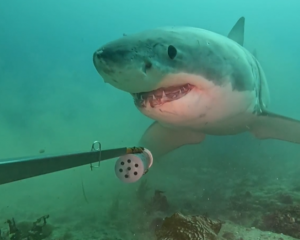
Ms Beynon is spending a second season on the ice, accompanying polar biologist Dr Sam Bowser and his American research team to Explorers Cove, New Harbour.
They will be based at a remote field camp on the edge of the Taylor Dry Valleys and collaborate on art-science projects.
Her roles would be field and lab assistant, cook, dive tender and skidoo driver as well as artist.
From McMurdo Base where she was undergoing a refresher course in ice safety and survival training, Ms Beynon said they would take a 40-minute flight from McMurdo to Explorers Cove tomorrow morning to where the sea ice stretched out from the camp in all directions.
"There's no-one there but us, and nothing but untouched, uninhabited landscape for miles in every direction."
It was a "stark, spare, desolate place" where silence was "a voice you can hear and a presence you can feel".
"We hear the wind roaring down the valleys long before we feel it in camp; when it arrives, it sets our flags flapping and stirs up the volcanic grit."
The ice sounds were more subtle and when you were out walking or working on it, it creaked, sighed and sang, she said.
One of her projects involved placing microphone probes into the tide cracks alongside their field camp to record the music of the ice.
They would live between a Jamesway shelter and tents so there was little privacy and few luxuries, as everything they used or produced had to be collected and flown out by helicopter at the end of the season.
"We are each allowed a small puddle of water to wash in once a week or so, and must then use the same water for washing clothes."
Despite restrictions, Ms Beynon said she "absolutely loves it".
"I appreciate the way everything there is reduced to its absolute basics - the landscape's stripped down; all the stuff that ordinarily fills our lives, living and work spaces . . . recedes and becomes less important."












